#love a good thinking about the meta
Text
I just. I love eyrie and their twin bc eyrie owes him so much and they didn’t even ask for it. he spoke for them, was their only friend for a long time, understood what they meant; they took care of each other in the only ways siblings can. they were inseparable and the absence of each other is still such a heavy grief
#it’s a grief in the way of knowing that he is still alive and yet they can never go back#there is no returning. the loss of innocence and out into the real world#it’s also got me thinking about eyrie and estinien becoming siblings after a fashion#so much of their parallels come down to choice#choice and the lack thereof in regards to family#Estinien losing his family and choosing to let that vengeance be that which keeps him going#eyrie forsaking family and making the choice to leave but it is done for their family#love a good thinking about the meta#oc: eyrie kisne
8 notes
·
View notes
Text
If we DO ever get a Good Omens season 3 (and fingers crossed we will) then using the Second Coming as the narrative device to facilitate the final culmination of Good Omens' ideology and message is brilliant, actually.
Because the Second Coming IS NOT another Adam situation. And, contrary to the misconceptions I've seen, It IS NOT about Jesus being born again as a baby, etc, etc.
THE SECOND COMING. QUITE LITERALLY refers to THE LAST JUDGMENT.
As in. The SAME Last Judgment Michelangelo painted on the walls of the Sistine Chapel. As in - THE JUDGMENT of the Living and the Dead. THE LAST, FINAL, ETERNAL JUDGMENT.
It's the WHOLE thing Armageddon was leading towards. Book of Revelation speedrun: the world ends, everyone dies, and then they get resurrected again to be judged by JESUS himself. He will flick through the Book of Life (WINK WINK WINK DO YOU SEE HOW LOUDLY I'M WINKING AT YOU???), and if your name is there he will go "oh nice you deserve eternal paradise! :D" and if your name is ERASED from the Book of Life he will go "oh no, sorry, you go to the lake of fire for eternity now D:" (except apparently in Good Omens lore it'd just DOOM YOU TO NON-EXISTENCE FOREVER???)
And if you THINK about it, The Last Judgment is the ultimate manifestation of moral absolutism. No shades of gray, no chances. Just BLACK, and WHITE. Never mind that you're like Wee Morag and Elspeth, who are forced to do "bad" things because of circumstances. It's either you pass Judgment Day, or you burn (or disappear forever.)
And the way THINGS are going in the Good Omens universe? I don't think there's ANYONE "good" enough to be "saved." Not Crowley, not Aziraphale. Hell, not even the Archangels themselves.
So it provides a PERFECT opportunity for Aziraphale and Crowley to UPEND that SYSTEM entirely.
I think that's what Crowley and Aziraphale would do in s3: establish a new kind of system in which angels and demons have free will to determine the right (or wrong) choice.
Giving them the APPLE, so to speak.
And then they'll go off to retire in a cottage, together at last.
#good omens#good omens 2#good omens meta#ineffable husbands#aziraphale#crowley#im sorry but i choke everytime someone refers to a baby jesus for the second coming#like i love yall and parent trapping aziraphale and crowley by the infant son of god would be amusing as heck#but also i rlly think this is about the Last Judgment guys KSLDSKDKLDS#thank you good omens yes this IS in fact how i use my collection of niche trivia on christian eschatology#putting my religious trauma into good use iktr
6K notes
·
View notes
Text

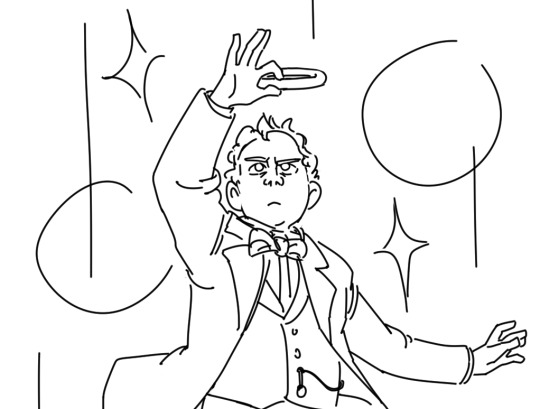


actual scene as it happened in the show
#gos2spoilers#spoilers#good omens#good omens spoilers#hopefully i tagged enough for blacklists#ransart#everyone is typing up beautiful meta analyses and painting beautiful art and i'm here like...#thinking non stop about this part LOL#i just love it; how many does he have? how long is the cooldown period for this 9th level cleric spell#no want sad; only fun
5K notes
·
View notes
Text
I'm seeing some confusion out and about over the title A Companion to Owls (generally along the lines of 'what have owls got to do with it???'), so I'd like to offer my interpretation (with a general disclaimer that the Bible and particularly the Old Testament are damn complicated and I'm not able to address every nuance in a fandom tumblr post, okay? Okay):
It's a phrase taken from the Book of Job. Here's the quote in full (King James version):
When I looked for good, then evil came unto me: and when I waited for light, there came darkness. My bowels boiled, and rested not: the days of affliction prevented me. I went mourning without the sun: I stood up, and I cried in the congregation. I am a brother to dragons, and a companion to owls.
--(Job 30:29)
Job is describing the depths of his grief, but also, with that last line, his position in the web of providence.
Throughout the Old Testament, owls are a recurring symbol of spiritual devastation. Deuteronomy 4:17 - Isaiah 34:11 - Psalm 102: 3 - Jeremiah 50: 39...just to name a few (there's more). The general shape of the metaphor is this: owls are solitary, night-stalking creatures, that let out either mournful cries or terrible shrieks, that inhabit the desolate places of the world...and (this is important) they are unclean.
They represent a despair that is to be shunned, not pitied, because their condition is self-inflicted. You defied God (so the owl signifies), and your punishment is...separation. From God, from others, from the world itself. To call and call and never, ever receive an answer.
Your punishment is terrible, tormenting loneliness.
(and that exact phrase, "tormenting loneliness," doesn't come from me...I'm pulling it from actual debate/academia on this exact topic. The owls, and what they are an omen for. Oof.)
To call yourself a 'companion to owls,' then, is to count yourself alongside perhaps the most tragic of the damned --not the ones who defy God out of wickedness or ignorance, and in exile take up diabolical ends readily enough...but the ones who know enough to mourn what they have lost.
So, that's how the title relates to Job: directly. Of course, all that is just context. The titular "companion to owls," in this case, isn't Job at all.
Because this story is about Aziraphale.
The thing is that Job never actually defied God at all, but Aziraphale does, and he does so fully believing that he will fall.
He does so fully believing that he's giving in to a temptation.
He's wrong about that, but still...he's realized something terrifying. Which is that doing God's will and doing what's right are sometimes mutually exclusive. Even more terrifying: it turns out that, given the choice between the two...he chooses what's right.
And he's seemingly the only angel who does. He's seemingly the only angel who can even see what's wrong.
Fallen or not, that's the kind of knowledge that...separates you.
(Whoooo-eeeeee, tormenting loneliness!!!)
Aziraphale is the companion.
...I don't think I need to wax poetic about Aziraphale's loneliness and grappling with devotion --I think we all, like, get it, and other people have likely said it better anyway. So, one last thing before I stop rambling:
Check out Crowley's glasses.


(screenshots from @seedsofwinter)
Crowley is the owl.
Crowley is the goddamn owl.
#good omens#good omens 2#ineffable husbands#aziracrow#aziraphale#crowley#there's probably a few thousand words more I could say about this but. I think I'll just hang the implications deliciously aloft for now.#something something tfw the embodiment of all your worst fears and self-doubts shows you the only real kindness you've known for centuries#you can't help but love him and you can't help but fear him but above all you TRUST him the way you're supposed to trust God but don't#brrrrrrr#do you think Crowley would vibe with being an omen of spiritual devastation or do you think he would get drunk about it#good omens meta
3K notes
·
View notes
Text
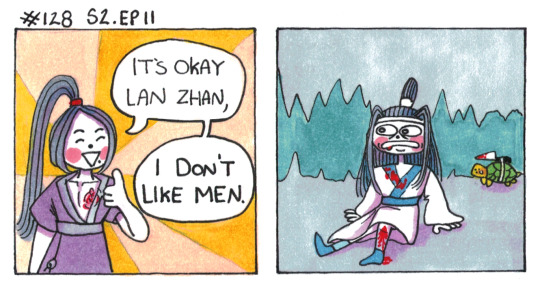
His palms are sweaty, knees weak, arms are heavy.
[First] Prev <–-> Next
#poorly drawn mdzs#mdzs#wei wuxian#lan wangji#tulu xuanwu#blood#Vomit on his sweater already; mom's spaghetti#I love drawing teenji because he gets to be a lot more expressive than Older Lan Wangji.#wwx is trying so hard to be supportive and it keeps backfiring for lwj.#“There's no way I would ever want you carnally ^_^” meanwhile the guy who wants him carnally is losing his mind in agony.#Hot tip if you keep finding yourself in Lan Zhan's shoes: consider being more obvious. Give up on trying to be subtle with an ADHDer.#His game is SO BAD. Abysmally bad rizz. I do not think it was possible for these to to have a chance to get together in this life.#He has no plan. He has no healthy outlet for his feelings. He is looking at his half naked crush and losing his shot.#F in the chat for Lan Zhan. He's just been accidently rejected and he is about to be accused of being straight.#Meta commentary moment: I am going to try very hard to be more consistent with outfits and details across comics#I have had some...difficulties in the past with forgetting details (COUGH the vermillion mark COUGH)#New year new goals! Wish my ADHD eyes and brain good luck!
1K notes
·
View notes
Text
Miguel is Fine, Actually (Being Spider-Man's Just Toxic As Hell)
Before I watched ATSV I said that I would defend my man Miguel O'Hara's actions no matter what, because he's always valid and I support women's wrongs. I was joking, and I did not actually expect to start defending him on Tumblr.edu. But I'm seeing a lot of commentary that's super reductive, so I do want to bring up another perspective on his character.
Miguel wasn't acting against the spirit of Spider-Man, or what being Spider-Man means. Miguel isn't meant to represent the antithesis of Spider-Man. Miles is the antithesis of Spider-Man. Miguel represents Spider-Man taken to its extreme.
Think about Miguel's actions from his perspective. If you were a hero who genuinely, legitimately, 100%, no doubt about it, believed that somebody is going to make a selfish decision that will destroy an entire universe and put the entire multiverse at severe risk - if you had an over-burdened sense of responsibility and believed in doing the right thing no matter what - you would also chase down the kid and put him in baby jail to try and prevent it. He believed that he was saving the multiverse, and that Miles was putting it in danger for selfish reasons. Which is completely unforgivable to him, because selfishness is what he hates the most. And then he goes completely out of pocket and starts beefing with a 15yo lmfaooo he's such a dick.
But why did Miguel believe that? Why did he believe that Miles choosing himself and his own happiness over the well-being of others was the worst possible thing? Why did he believe that tragedy was inevitable in their lives, and that without tragedy Spider-Man can't exist?
Because he's Spider-Man.
Peter Parker was once a fifteen year old who chose his own happiness over protecting others. It was the greatest regret of his life and he never forgave himself. Peter's ethos means that he will put himself last every time, and that he will sacrifice anything and everything in his life - his relationships, his health, his future - to protecting and helping others. Peter dropped out of college because it interfered with Spider-Man. He destroyed his own future for Spider-Man. He ruins friendships and romantic relationships because Spider-Man was more important. If Peter ever tries to protect himself and his own happiness, then he's a bad person.
That is intrinsic to Peter. Peter would not be Peter without it. A story that is not defined by Peter's unhappiness is not a Spider-Man story. If Peter doesn't make himself miserable, then he's just not Peter.
That is a Spider-Man story: that not only is tragedy inevitable, that if you don't allow yourself to be defined by your tragedy then you're a bad person. If you don't suffer, then you're a bad person. If you ever put anything above Spider-Man, then you're killing Uncle Ben all over again. Miguel isn't the only one that believes this - as we saw, every Spider-Man buys into what he's saying. There's no Spider-Man without these beliefs.
Miguel attempted to find his own happiness, and he was punished in the most extreme way. He got Uncle Ben'd x10000. He tried to be happy, and it literally destroyed his entire universe. It's the Spider-narrative taken to the extreme. Of course Miguel believes all of this. Of course he believes this so firmly. He's Spider-Man. That's his story. And the one time Miguel tried to fight against that story, he was punished. And like any Spider-Man, he'll slavishly obey that narrative no matter the evil it creates and perpetuates. Because if he doesn't, the narrative will punish him. The narrative will always punish him. It's a Spider-Man story.
I don't think the universal constant between Spider-Mans, the thing that makes them Spider-Man, is tragedy. I think it's the fact that they never forgive themselves. And Miguel is what that viewpoint creates. He doesn't believe this things because he's an awful, mean person. He believes them because he's a hero. He's a good person who hates himself.
Across the Spider-verse isn't really a Spider-Man story. It's a story about Spider-Man stories. Miguel's right: if this was a Spider-Man story, then Miles acting selfishly really would destroy the universe. But Miles' story isn't interested in punishing him. It pushes back against Peter's narrative that unhappiness is inevitable and that you have to suffer to be a good person. It says that sometimes we do the right thing from love and not fear, and that Peter's way of thinking is ultimately super toxic and unhappy. ITSV was about Miles deciding that he didn't need to be Peter Parker, that all he needed to be was Miles, and ATSV is about how being Peter Parker isn't such a good thing. Miguel shows that. Whatever toxic and unhealthy beliefs he holds - they're the exact same beliefs that any Spider-Man holds. He's a dick, but I don't think he's any more awful a person than Peter is.
TL;DR: Miguel isn't a bad person, he just has Spider-Man brainrot.
#across the spider-verse#atsv#atsv spoilers#across the spider-verse spoilers#across the spiderverse#across the spider verse#miguel o'hara#atsv meta#source: i recognized an embarassing amount of those cameos#im also seeing a lot of ppl make a lot of assumptions about what miguel was injecting and why#we dunno guys! im not gonna suppose anything#I just think that Miguel and Miles are great foils#and that what makes them interesting as foils#is the fact that they're both good people who want to do the right thing#miguel shows how that gets twisted#to the point where you beef with a 15yo sometimes which is still so funny#im a big spidey 2099 fan#which I love bc it is NOTHING like spiderman and yet it's such a good spiderman story#but talking about comics migs is useless bc he has 0 in common with atsv migs#but there is a lot of VERY cool stuff to say about how#the sm2099 comic has nothing to do with spiderman at all whatsoever extremely pointedly#but its still a wonderful spiderman story that finds its own way#tbh it was kind of a breath of fresh air to read a spider-man story that wasn't about spider-man for once#and that was just about miguel#anyway stan women's wrongs#miguel o hara#miguel ohara#my writing
3K notes
·
View notes
Text
Aziraphale didn't choose Heaven
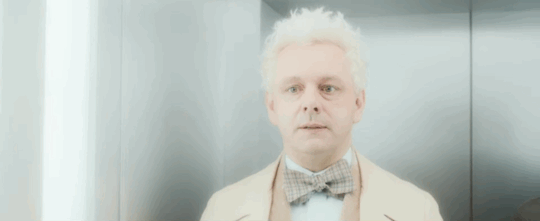
Aziraphale didn't take the job as Supreme Archangel because he wanted to be on Heaven's side again. And he didn't do it to protect Crowley, either.
He did it because he thought it was right.
Because Aziraphale always does what he thinks is right. He has his own moral center, and he will fight tooth and nail for it. He will lie to God's face about giving away his flaming sword for it. He will defy Gabriel and all the archangels at the end of the world for it. He will risk his angelhood to protect children for it; he will risk his precious, peaceful, fragile existence to protect a forgetful archangel for it. He will let Crowley, the love of his life, go on his own to Alpha Centauri for it; and he will leave him again, alone and broken, heartsick at doing so, on Earth for it.
Because nothing, nothing is more important to Aziraphale than doing the Right Thing.
And that's what Crowley loves about him.
#And#I think that Crowley#After the initial heartbreak of Aziraphale leaving#Will be just a little bit proud of him#For still doing what he thinks is right#Even if Crowley thinks it's wrong#Good omens#Good omens meta#Aziraphale#My meta#I too love this about Aziraphale#Even if sometimes it's frustrating as hell
370 notes
·
View notes
Text
boba fett's childhood is such an untapped goldmine of uncanny existential horror, even before he loses his father.
like, imagine growing up never seeing another child except those that are identical to you—carbon copies in every way, except their heads are shaved, they're plugged into machines all day, and they never stay children for very long. the ones that survive turn into men who look like your father, but your father calls them cattle, cannon fodder.
you're a clone, too. you should be cattle like them, but your father doesn't call you those things. he says you're his real son and that he loves you.
your father loves you. this is what distinguishes you from the cattle and the canon fodder. your father loves you and that's what makes you a person.
and :) then :) he :) fucking :) dies :)
#boba fett#jango fett#star wars#boba fett meta#i think LoTF really hit the nail on the head in their portrayal of adult!boba's feelings about his father#in that yes he loves his father and thinks he was a good dad#and also just so happens to have a near-religious dread of the man#and feels constantly scrutinized and judged by him even decades after his death#it's tragic bc jango DID love boba unconditionally and really seemed to do his best to be a loving father#and yet... bc of his own trauma his best still happens to include a lot of uh. not-great things#that man really should've gone to therapy before having a kid i tell you what
4K notes
·
View notes
Text
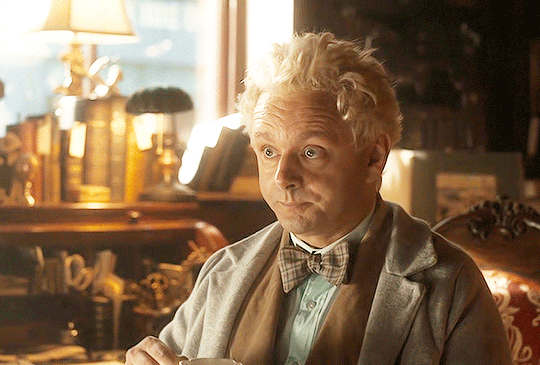
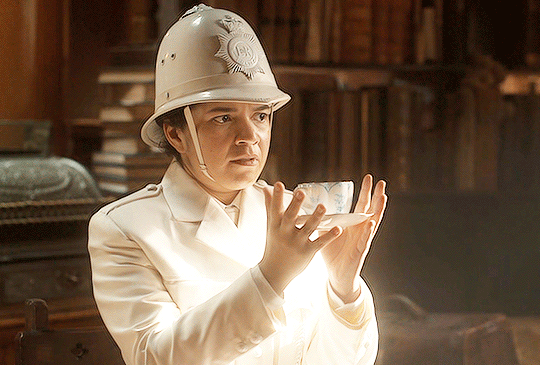
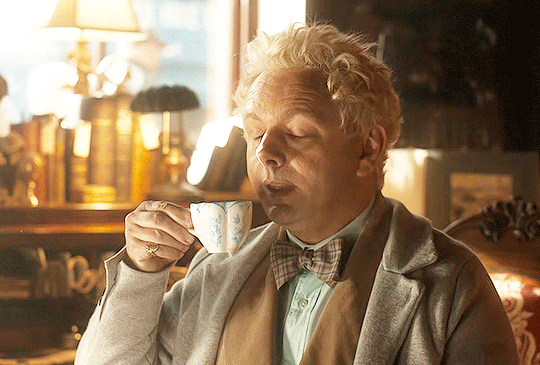
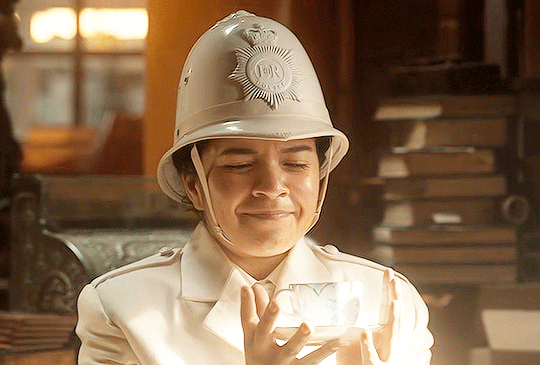
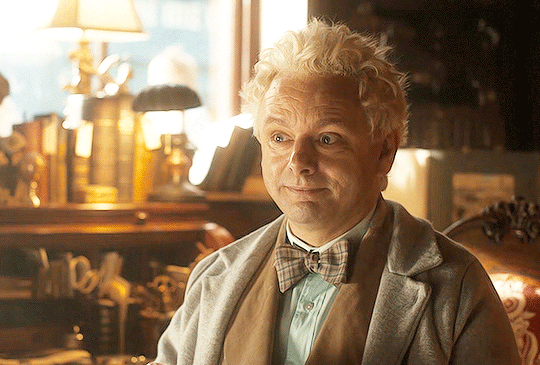
#good omens#aziraphale#muriel#goodomensedit#tvgifs#tvedit#my gifs#gifs#can I meta on my own post?#obviously I love how precious they are both being#muriel is the sweetest thing#and aziraphale respects her boundary about the tea which kudos for that#but his face isn't just sympathy#it's empathy#he must remember what he was like before crowley temped him#he also bought into heaven's propaganda that human stuff is wrong or gross or not fit for angelic consumption#but crowley showed him it is good and wonderful in its own way#and I think he is reliving everything muriel is missing out on in that moment
576 notes
·
View notes
Text
Fit: Alright Ramon, I'm gonna tell you a bedtime story about nighttime.
Fit: Now, nighttime of course is when monsters come out, and they try and scare little eggs just like you. But, the thing about nighttime is that as long as you have a source of light, you will be safe. That's right. And Ramon, do you want to know what my source of light is on this island? It's you, my boy. You are my light on this island. Without you, I would be covered in darkness.
Fit: So, I'm just- I'm just so glad to have you as my boy. That's right.
Ramon: [Nods and holds up his totem]
Fit: Oh, Ramon... Yeah, that's right – you got that totem right there! You're going to be nice and safe with that as well! That's right. But I'm just uh– I'm glad you woke up today, Ramon. I was getting worried about you for a second, but no, you're a tough kid. So, I'm just glad you woke up.
#FitMC#Ramon#QSMP#Fit#Literally losing my damn mind over this quote#like. bruh#Thinking about q!Fit's character growth since the start of the Island and how he's opened his heart more#but also thinking about how Ramon made Fit promise not to go into a murderous rampage if he lost both his lives and died for good#Thinking about q!Fit and his relationship with love and hope...#o(-(#Anyways I'll leave meta for the main but posting this clip for everyone to go crazy over it with me in the meantime#I look forward to reading the tags on this post#June 6 2023
267 notes
·
View notes
Text
I’ve mentioned this elsewhere but it feels relevant again in light of the most recent episode. Something that’s really fascinating to me about Orym’s grief in comparison to the rest of the hells’ grief is that his is the youngest/most fresh and because of that tends to be the most volatile when it is triggered (aside from FCG, who was two and obviously The Most volatile when triggered.)
As in: prior to the attack on Zephrah, Orym was leading a normal, happy, casual life! with family who loved him and still do! Grief was something that was inflicted upon him via Ludinus’ machinations, whereas with characters like Imogen or Ashton, grief has been the background tapestry of their entire lives. And I think that shows in how the rest of them are largely able to, if not see past completely (Imogen/Laudna/Chetney) then at least temper/direct their vitriol or grief (Ashton/Fearne/Chetney again) to where it is most effective. (There is a glaring reason, for example, that Imogen scolded Orym for the way he reacted to Liliana and not Ashton. Because Ashton’s anger was directed in a way that was ultimately protective of Imogen—most effective—and Orym’s was founded solely in his personal grief.)
He wants Imogen to have her mom and he wants Lilliana to be salvageable for Imogen because he loves Imogen. But his love for the people in his present actively and consistently tend to conflict with the love he has for the people in his past. They are in a constant battle and Orym—he cannot fathom losing either of them.
(Or, to that point, recognize that allowing empathy to take root in him for the enemy isn't losing one of them.)
It is deeply poignant, then, that Orym’s grief is symbolized by both a sword and shield. It is something he wields as a blade when he feels his philosophy being threatened by certain conversational threads (as he believes it is one of the only things he has left of Will and Derrig, and is therefore desperately clinging onto with both bloody hands even if it makes him, occasionally, a hypocrite), but also something he can use in defense of the people he presently loves—if that provocative, blade-grief side of him does not push them—or himself—away first.
(it won’t—he is as loved by the hells as he loves them. he just needs to—as laudna so beautifully said—say and hear it more often.)
#critical role#cr spoilers#bells hells#orym of the air ashari#cr meta#imogen temult#ashton greymoore#liliana temult#this is genuinely completely written in good faith as someone who loves orym#but is also about orym and so will inevitably end up being completely misconstrued and made into discourse. alas#I could talk about how Orym’s unwillingness to allow the hells to actually finish/come to a solid conclusion on Philosophy Talk#is directly connected to one of the largest criticisms of c3 (that they are constantly having these conversations)#all day. alas. engaging with orym’s flaws tends to make people upset#it is ESP prevelant when he walks off after exclaiming ‘they (vangaurd) are NOT right’#which was not only never said but wasn’t even what they were talking about#he even admits as much to imogen like ten minutes later! that he is incapable of viewing it objectively#which is 100% justifiable and understandable but simultaneously does not make his grief alone the most important perspective in the world#also bc i fear ppl will play semantics on my tags yes the line ‘i hope she’s right’ was said but it was from ASHTON#who does not believe they are at all and wasn’t saying they actively WERE right. orym just heard something to latch onto and ran with it#ultimately there is a reason orym only admitted that he was struggling when he had stepped away to talk to dorian#who has not been around and thusly has not changed once n orym's eyes#and it isn't that the hells never check in or care. they do. they have several times over#it is dishonest to say they haven't#the actual reason is that all of this is something He Is Aware Of. he doesn't mention it bc he KNOWS it's hypocritical and selfish#he says as much!#EXHALES. @ MY OWN BRAIN CAN WE THINK ABT MOG AGAIN. FYRA RAI EVEN. FOR ME.#posting this literally at 8 in the morning so I can get my thoughts out of my brain but also attempt to immediately make this post invisibl
158 notes
·
View notes
Text
After twenty years, the thing I still don't get is that everything cruel that can be said and has been said against Zutara romance can also be said against their friendship--and Zuko's friendships with the other characters!--and yet somehow friendship is always good and pure but romance would immediately make their healthy friendship dynamic bad and abusive???
But that's not how relationships work. If they can have a healthy friendship, then they could have a healthy romance. If any romance is inherently unhealthy, then the friendship must be inherently unhealthy too.
You've got the original writers saying women who think that Katara and Zuko should be together will forever have "failed relationships"... and then, at the same time, those same writers are like yay let's write them bonding and building a friendship.
People calling a brutally abused child who went on a redemption arc and turned against his father's ways a "colo/nizer" when it's a romance, but when it's friendship it's all good somehow. If lips never touch, it's not possible for a relationship to be toxic??? But if lips DO touch, then a healthy friendship based on mutual respect immediately becomes a Lifetime movie about toxic boyfriends...
The only way this logic works is if you think romantic love immediately "corrupts" or "taints" in a way friend love doesn't. And that's an incredibly ugly, sad idea to push.
#zutara#atla meta#i'm actively hoping that if the live action does k/a they do it better#and in a way where K is treated more like a heroine#falling in love#than an object of desire for K#but... at the same time#i can't believe the stuff people say about z/k#i get my ship isn't going to be canon but i don't think it needs to be to be a good interesting dynamic nonetheless#and people just say the wildest most asinine things
229 notes
·
View notes
Text
i've been rewatching the good place with a friend lately so i've been thinking about it a lot and i just keep thinking
about how eleanor says so much that she's not a bad person, she's just a "medium" person. she didn't kill anyone, she didn't technically abuse anyone, she was selfish but not "horrible," she was human.
except when we see eleanor pre-death, we see something different. no, she didn't murder anyone. but she was pretty horrible. she was really good at lying to elderly people to sell them fake drugs. she abused her friend's dog. she lied to her coworkers to get out of driving for them at the bar. she felt so threatened by people feeling like they were better than her that when she saw concrete proof that a coffee shop manager was misogynistic and sexually assaulted someone, she enthusiastically supported the cafe to be contrary to her boyfriend.
she is very obviously a horrible person. even in season 2, michael calls her a manipulative demon; that's not something you get called if you're just a "medium" person. what we're told, and what her reasoning is a lie. but she doesn't know it. it's a lie to the viewers.
she also stands in stark contrast with jason—who has broken the law multiple times, has gotten arrested multiple times, likes celebrities and hobbies that have a terrible reputation (not just for being "trash" but for being actively hateful), and even if he might not have killed someone, there's probably something in his repertoire that comes close. but at the same time, it's very, very obvious to see that he's a good-hearted person, who wants to do more good than harm. compared to eleanor, whose bad actions are much smaller in comparison, but her bad personality makes her less likable, and much worse. yes, of course it's about environment—but it's also about how goodness might be more accurately judged by intent than by action.
i saw someone say that it was unrealistic that eleanor didn't call chidi a racial slur when she was a white woman from arizona. sentimentally, i agree with the realism argument. but at the same time, i think it would've been out of place. eleanor would know that saying a slur is on a different level of wrong. a lot of the bad things she did were indirect; it was a lot about what she did when no one was looking. but she didn't want to see herself as a horrible person, so she wouldn't have wanted anyone to see either. as long as they didn't get too close for her.
eleanor being a "medium" person is a lie. of course she belongs in the bad place. she's initially presented as a "medium person" because the story wants us to be on her side, wants us to believe that she's as human as us, until the season one flashbacks start to tell a different story. then it makes us squint and go, no, eleanor really is a terrible person. but the show is aware of this too!
and yet, the thesis of the show is that bad people can always get better. that no one is beyond rehabilitation; that society fucks us up but it's still the choices that we make that mean the most about who we are in the end. we get to see the growth of eleanor's good person journey through the entirety of season one, so that even as we realize she was a shitty person on earth, we're still rooting for her by the end of it. season one is the show's entire thesis; seasons two through four are just proving it to us. and eleanor proves herself to us over and over again, so that even as we know how terrible she was, and how terrible she's capable of being, we still know and believe that she belongs in the good place at the end.
#eleanor is just. a really good protagonist!!!! ugh#also i just love the good place and i kept thinking about this#the good place#tgp#eleanor shellstrop#i guess#i will not often write meta about white women but mike schur really went hard with this one#an aroceu original
873 notes
·
View notes
Text
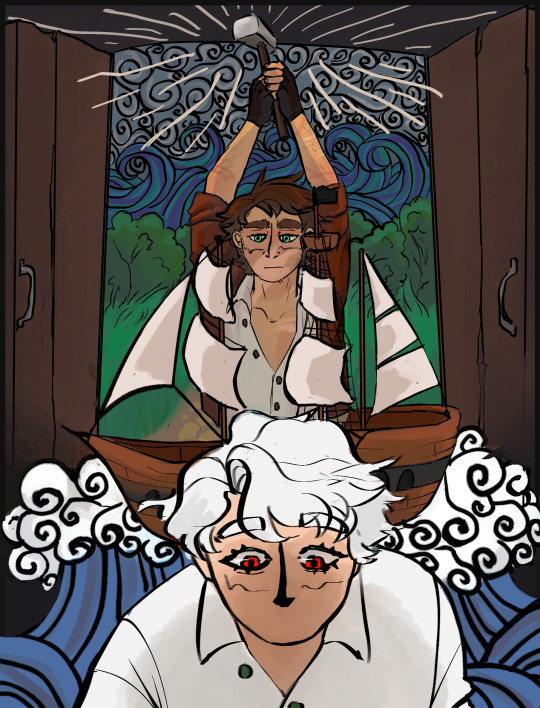
The first one I finished, and the final piece im posting for @hermitshippingbigbang! :D This is for the thrilling Sail with us (and we'll show you what it means to be alive!) by @hydeomonster !! Smalletho decide to go sailing and have a time!
#court jester's art#court jester's fanfiction appreciation moment#hermitshipping#<- the fic itself#hsbb 2023#ethoslab#goodtimeswithscar#smalletho#think its appropriate considering this is for the fic which is yk. about them#im just the kinda guy who cant help their love for gtws and a dramatic moment#hermitcraft#The fic is so good man! Go read!#Had a lot of fun working on this! :D Also being on the team with meta my beloved was a highlight for sure ^^ It's going to post later so!#read the fic and also wait for the amazing art from them!!!
191 notes
·
View notes
Text
Okay inspired by this post by @irispurpurea and this post by @ouidamforeman (both of which are excellent, please read) I wanted to add some thoughts about the structural weirdness of season 2.
The reason season 2 feels so structurally WEIRD is that it's the second beat what is now a three act story, but that wasn't written as one in the first place.
Season 1 was a complete, self-contained story arc with completed character development, based on a complete, self-contained novel. The story of Good Omens is about an angel and a demon going from opposite sides to their own side, aligned with earth and its humans. And at the end of season one this story has been told! It's done!
If you want to keep the story going, then, you have two options -- either you find a completely new story to tell with these characters, or you do what Neil Gaiman et al have chosen to do and you complicate and unresolve the conclusion from the first story in order to tell the same story but in an even bigger and more nuanced way.
The challenge of season two, then, is to reframe the events of season one not as a completed story but as the first act of a three-act arc.
And genuinely I think this is just not the way that most TV shows tasked with writing their second season go about doing it. Not that this is a bad choice! But the reason it feels weird on first glance is because it's taking its structure from like... half of the sequel to a novel, not a TV show that gets a second season.
This is the point of all of the historical flashbacks in season 2-- to make us understand that Crowley and Aziraphale are not on the same page and haven't been for 6000 years, despite appearing to be by the end of the first season.
The other thing I think season 2 does is make the whole story about Crowley and Aziraphale's relationship in a way it just wasn't in season 1. Taken on its own, season one's A-plot is the apocalypse, and the B-plot is relationship between this angel and demon.
What season two does then is literally FLIP the importance of those two things structurally. Season one's apocalypse and various side characters now occupy the same place as the Gabriel mystery in season 2. Which is also why it feels so weird to be like "wait this thing that felt like The Big Important Thing before is now suddenly the background of something else."
All this to say, this season is SO structurally interesting because it's just straight up not like other TV shows in structure, and because of the way everything now has to be marketed and framed in trailers as one, more typical kind of story, AND because the first season was a complete story that has now been reframed as an incomplete story, Good Omens season two feels very weird but imo much less weird upon rewatching, and will again feel less weird once we have season 3 and the story gets to complete its arc.
#good omens meta#good omens#good omens analysis#good omens s2#anyway I have been THINKING THOUGHTS lately lmao#and the state of television right now is so fucked but also so interesting to me#if they told the exact same story but as a 12-episode second series instead of two 6-episode series#I think people would feel completely different about it -- myself included!#is Good Omens perfect? no. Do I love it with my whole heart forever? absofuckinglutely#my good omens meta#sitzfleischh.meta
474 notes
·
View notes
Text
literally nobody asked for it, but here's my list of saltburn essays that i've slowly been drafting over the course of the last week which WILL be required reading for anybody trying to engage with me about this movie. my very personal saltburn 101 syllabus just dropped
A Wolf in Deer's Clothing: Saltburn's Attempt at Innocence
an examination of party costumes and our character's last attempts to masquerade as something they're not: felix—an angel, all-forgiving and all-knowing, something to be worshiped; and oliver—a prey animal, prey to class-divide, prey to saltburn, prey to felix.
thoughts about oliver specifically are loosely organized in my #bambi tag
A Midsummer Night's Mare: Farleigh Start as the Ultimate Victim of Saltburn
a farleigh character study, about the ways he was mistreated and manipulated at saltburn, about fighting to stay alive and the scars left behind by knowing when to give in
alternatively titled "QuickStart", may be adapted into a conclusive essay specifically focusing on oliver and farleigh's relationship
The Eye of the Beholder: On Saltburn's Voyeurism & Violence [working title]
how wealth and class pushes the catton's toward the volatile reality of being able to look, but not touch. on desire and the lack thereof, and portraying yourself as an object to be desired
may end up as two separate essays on wealth and aestheticism but i'm pushing toward a conclusive essay about the intersection of the two, which i feel is at the heart of saltburn
alternatively titled "Poor Man's Pudding: A Melvillian Approach to Saltburn's Class", again, may be adapted into it's own essay
Gender-Fluid: A Study in Sexuality and Saltburn's Desire to be Dry
a deep dive into the bodily fluids of saltburn and how oliver upsets the standard of men who are just so lovely and dry. on the creative choice to lean into the messy wetness of sex and desire and the audience's instinct toward repulsion
a celebration of the grotesque and an examination of why we would label it as such
least developed of the four, heavily inspired by @charnelpit's lovely post about the fluids in saltburn
if anybody is actually interested in any of these, i can work toward something closer to a finished piece instead of just bullet points and quotes in a google doc, but mostly this is so i can share my very brief takes on a multitude of themes in saltburn that have been haunting me
edit for people seeing this in the future: all posts about my essays are being organized into my #saltburn 101 tag if you’re interested in following these through to development!
#saltburn#saltburn posting#really desperately need someone to pay me to write saltburn essays all day#or else these will never be more than a smattering of bullet points#and these are only the most developed of the millions of the thoughts that i've had rolling around in my brain this last week#idk if lengthy meta-essays are interesting to literally anyone other than me#but if any of these speak to u and u have thoughts abt them#of course u are welcome to send them my way#i think all of these were born out of either seeing bad fandom takes (ie. everything ive seen about farleigh and oliver)#or rly good fandom takes that haven't been talked about enough like the fluids thing#anyway#oh also if u want any interview clips that back up any of these ideas i have a list thats like a million miles long#and would be happy to dig for any specific things im talking about here#bambi#also also im sorry i kno the colon in academic essay titles is so overused i just love a subtitle sm#i love love love a clever little essay title. titling my essays was literally my favorite part of the essay process in college#saltburn 101
339 notes
·
View notes